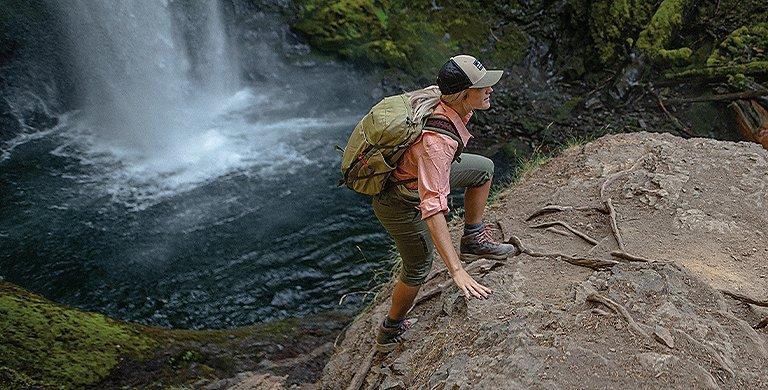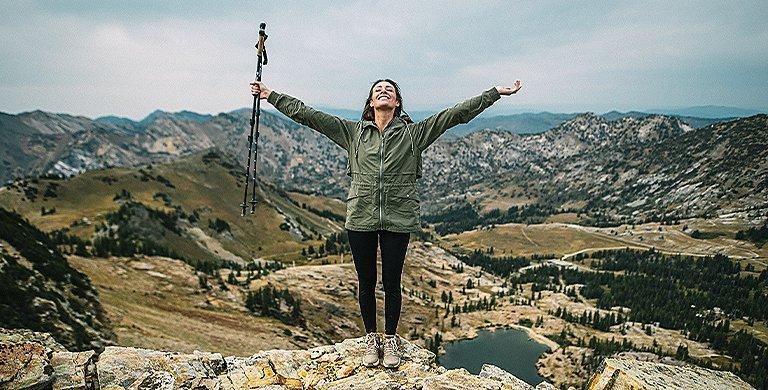HIKING
Leave No Trace: Rules for Hiking Ethics and Etiquette
Learn how to become a more ethical hiker with our quick-guide to Leave No Trace principles
BY DAVID YOUNG
Whether you’re on a solo hike in the wilderness or camping with friends, there are principles to follow that reflect good stewardship of the outdoors and respect for those you may encounter on your adventure.
Leave No Trace is both an organization and a philosophy dedicated to promoting etiquette that supports environmental sustainability and ethical behavior in the outdoors.
To help you feel confident that you’re doing your best by Mother Nature and those who share your love of the outdoors, we’ve compiled a guide to help you understand what it means to adventure ethically and learn about the principles that will make engaging with the outdoors a pleasant and peaceful experience for everyone.
Leave No Trace is both an organization and a philosophy dedicated to promoting etiquette that supports environmental sustainability and ethical behavior in the outdoors.
To help you feel confident that you’re doing your best by Mother Nature and those who share your love of the outdoors, we’ve compiled a guide to help you understand what it means to adventure ethically and learn about the principles that will make engaging with the outdoors a pleasant and peaceful experience for everyone.
What are wilderness ethics?
The American Hiking Society defines wilderness ethics as simply being respectful of the land and other hikers.
While these ethics are most often applied to hiking due to its popularity among the general population, wilderness ethics should be practiced anytime you are camping, backpacking, trail running, fishing, snowshoeing, or mountain biking.
The idea of Leave No Trace isn’t just about picking up your trash. Wilderness ethics involve how you interact with the land as well as others who share spaces in nature. Advising people of your adventure plans and being quiet, considerate, and respectful of others while on the trail are just some of the principles that impact everyone in the wilderness.
Respect is at the core of wilderness ethics. In addition to respect for one another, wilderness ethics call upon us to acknowledge and respect indigenous lands by not defacing or damaging historical landmarks like geological formations and petroglyphs.
While these ethics are most often applied to hiking due to its popularity among the general population, wilderness ethics should be practiced anytime you are camping, backpacking, trail running, fishing, snowshoeing, or mountain biking.
The idea of Leave No Trace isn’t just about picking up your trash. Wilderness ethics involve how you interact with the land as well as others who share spaces in nature. Advising people of your adventure plans and being quiet, considerate, and respectful of others while on the trail are just some of the principles that impact everyone in the wilderness.
Respect is at the core of wilderness ethics. In addition to respect for one another, wilderness ethics call upon us to acknowledge and respect indigenous lands by not defacing or damaging historical landmarks like geological formations and petroglyphs.
The 7 Principles of Leave No Trace
Leave No Trace is a wilderness ethics framework made up of seven core principles that provide a road map for how to interact anywhere in nature, from your backyard to the backcountry.
Principle 1 – Plan ahead and prepare
The better you plan your trip the less chance you will adversely impact nature by being ill-prepared. Make sure to research all rules and regulations for the area you’ll be visiting. Ensure that you have the proper camping permits, and make sure it’s legal to build a fire. Carry the right maps and a compass and know how to use them. Also make sure someone not traveling with you knows where you’re going.
Principle 2 – Travel and camp on durable surfaces
To maintain the integrity of the land, it’s important to stay on established trails and camp only where permitted. Camp in a small group and avoid spreading out over a large area. By staying on well-traveled areas where vegetation is already gone, you eliminate further wear and tear on the natural environment and reduce the risk of creating multiple trails in an area that may not be manageable.
Principle 1 – Plan ahead and prepare
The better you plan your trip the less chance you will adversely impact nature by being ill-prepared. Make sure to research all rules and regulations for the area you’ll be visiting. Ensure that you have the proper camping permits, and make sure it’s legal to build a fire. Carry the right maps and a compass and know how to use them. Also make sure someone not traveling with you knows where you’re going.
Principle 2 – Travel and camp on durable surfaces
To maintain the integrity of the land, it’s important to stay on established trails and camp only where permitted. Camp in a small group and avoid spreading out over a large area. By staying on well-traveled areas where vegetation is already gone, you eliminate further wear and tear on the natural environment and reduce the risk of creating multiple trails in an area that may not be manageable.
Principle 3 – Dispose of waste properly
There are few things as disappointing in nature as finding garbage that someone has left behind. A simple motto to remember is “Pack it in, pack it out.” This includes sandwich bags, snack packaging, food waste such as banana peels, pet waste, toilet paper, and in some areas, human waste as well. If you break a tent pole, don’t just leave it—pack it out. When the fuel canister runs out, make sure to pack it out. And be proactive about picking up other people’s trash. By leaving the space the way you found it—or better—you’ll be doing your part to help the Earth.
Principle 4 – Leave what you find
Take photos and leave only footprints is the mantra of Leave No Trace. When you’re out in nature, leave rocks, sticks, plants, flowers, and other natural objects where they are. Don’t touch historical landmarks, features, or artifacts such as petroglyphs. Enjoy the landscape from a distance and don’t damage grasses, fauna, or tundra by going off designated paths. Following this important wilderness ethic will ensure the nature you enjoy today can be enjoyed by others tomorrow.
Principle 5 – Minimize campfire impacts
As recent events have proven, fire can be tragically devastating to nature. A campfire that gets out of control or is left burning unattended can quickly become a raging forest fire. The best suggestion for safety when it comes to fires in the wilderness is just to use a camp stove. Modern backpacking stoves are lightweight, easy to use, and will serve your cooking needs without having to create a campfire. If you do opt for a traditional campfire, make sure there are no fire bans in place and that you build it in an established fire ring.
There are few things as disappointing in nature as finding garbage that someone has left behind. A simple motto to remember is “Pack it in, pack it out.” This includes sandwich bags, snack packaging, food waste such as banana peels, pet waste, toilet paper, and in some areas, human waste as well. If you break a tent pole, don’t just leave it—pack it out. When the fuel canister runs out, make sure to pack it out. And be proactive about picking up other people’s trash. By leaving the space the way you found it—or better—you’ll be doing your part to help the Earth.
Principle 4 – Leave what you find
Take photos and leave only footprints is the mantra of Leave No Trace. When you’re out in nature, leave rocks, sticks, plants, flowers, and other natural objects where they are. Don’t touch historical landmarks, features, or artifacts such as petroglyphs. Enjoy the landscape from a distance and don’t damage grasses, fauna, or tundra by going off designated paths. Following this important wilderness ethic will ensure the nature you enjoy today can be enjoyed by others tomorrow.
Principle 5 – Minimize campfire impacts
As recent events have proven, fire can be tragically devastating to nature. A campfire that gets out of control or is left burning unattended can quickly become a raging forest fire. The best suggestion for safety when it comes to fires in the wilderness is just to use a camp stove. Modern backpacking stoves are lightweight, easy to use, and will serve your cooking needs without having to create a campfire. If you do opt for a traditional campfire, make sure there are no fire bans in place and that you build it in an established fire ring.
Principle 6 – Respect wildlife
Remember that when you’re in the woods, you’re a guest in the animals’ home, so make sure to be respectful. This means keeping your distance from and not feeding wildlife. Enjoy viewing elk, deer, birds, or bears through binoculars, but don’t approach them. If you happen to encounter animals on the trail, give them a wide berth to avoid causing them distress. And make sure to safely and securely store all food and personal products to keep any smells from attracting animals.
Principle 7 – Be considerate of other visitors
Being considerate of other visitors is one of the most important principles when adventuring outdoors. When you encounter others on the trail, consider the right of way—uphill hikers always have the right of way and mountain bikes yield to hikers. Hikers and mountain bikes both yield to horses. While hiking or at camp, respect nature by being quiet and not talking loudly or playing loud music. People seek time in nature for the peace and quiet it offers—don’t be the one who ruins that experience for them. Avoid hiking in groups that are too large for the established trails, and be sure to keep pets under control at all times.
Encourage others to act ethically outdoors by following the seven principles of Leave No Trace and leading by example.
Remember that when you’re in the woods, you’re a guest in the animals’ home, so make sure to be respectful. This means keeping your distance from and not feeding wildlife. Enjoy viewing elk, deer, birds, or bears through binoculars, but don’t approach them. If you happen to encounter animals on the trail, give them a wide berth to avoid causing them distress. And make sure to safely and securely store all food and personal products to keep any smells from attracting animals.
Principle 7 – Be considerate of other visitors
Being considerate of other visitors is one of the most important principles when adventuring outdoors. When you encounter others on the trail, consider the right of way—uphill hikers always have the right of way and mountain bikes yield to hikers. Hikers and mountain bikes both yield to horses. While hiking or at camp, respect nature by being quiet and not talking loudly or playing loud music. People seek time in nature for the peace and quiet it offers—don’t be the one who ruins that experience for them. Avoid hiking in groups that are too large for the established trails, and be sure to keep pets under control at all times.
Encourage others to act ethically outdoors by following the seven principles of Leave No Trace and leading by example.
Want to learn more about ethical hiking? Check out the Leave No Trace website



